- Home
- Priscilla Royal
The Twice-Hanged Man Page 2
The Twice-Hanged Man Read online
Page 2
Eleanor was taken aback. She and her family had just fled from possible capture by enemy soldiers, her sister-in-law had suffered a hard birthing, and Abbot Gerald wanted her to deal with a murder?
“The local sheriff, or crowner, is surely the one best suited to assist in this matter.” She did not even try to disguise her annoyance.
He shook his head. “The death of Father Payn is not within the jurisdiction of the king’s law.”
Eleanor searched his face for some clue to his character. Was he sincere in assessing the dilemma, or was he trying to take advantage of her reputation for solving crimes to avoid making any effort himself?
He was most certainly an interesting-looking man, one composed of a multitude of angles from his bony fingers to his pointed chin and hooked nose. His gray eyes suggested an equally sharp intelligence blunted by worry. She found no reason to distrust him more than any other mortal, and concluded he was likely a proud man from his stiff-backed stance. Such men do not easily beg for help and especially not from a woman.
“Please explain,” she said in a kinder tone. If nothing else, she owed it to a fellow religious to hear him out, even if she must find cause to refuse his request.
He picked up the mazer of wine sitting close by him on the table, took a small sip, and began.
“Father Payn was coming from the village very late at night and took the footpath along the edge of the forest to the abbey. It was there he was vilely murdered. No sooner had he been killed than a witness of good repute, a man named Bardolph, came around a bend in the path and saw the slayer kneeling by the corpse of our dear priest. When Bardolph cried out, the murderer vanished. The body was as warm as life, although the witness found no evidence of breath. The moon was full that night, and no clouds dulled the light. The witness clearly recognized the perpetrator as a man named Hywel.”
Had she missed something? Had she drifted into sleep for a moment? Eleanor shook her head. She saw no problem here that required her help. “Then surely this Hywel has been arrested.” I am also proud, she thought, and glad I did not betray my confusion like a weak woman.
Abbot Gerald took time to reply by taking a very slow sip of his wine.
“Hywel is a ghost,” he finally said, “the spirit of a Welsh brigand recently and most justly hanged for murdering good English soldiers in a cowardly raid. Satan has apparently released his sin-blistered soul from Hell to inflict revenge on our innocent village.”
Since Eleanor had yet to meet any such malign spirits, although she had most certainly encountered enough wicked flesh-and-blood mortals, she was disinclined to believe in ghosts. Not that she discounted the possibility of their existence. Satan was a wily creature. But she most certainly did believe the shadowy ones were exceedingly rare. “This ghost can be vanquished by virtuous men from your abbey. You, yourself, for instance…”
Again hesitating, he took another measured swallow of wine.
I suspect he is trying very hard not to reveal that he thinks I am slow of wit and does not wish to be rude. Or else, she thought, he is taking time to enjoy a better quality wine from a Wynethorpe lodge than he is likely to get in his abbey. With minimal fervor, she rebuked herself for such irreverent thoughts.
“We have tried all we can to rid our village of Satan’s minion. We have failed.”
“A messenger could be sent to the nearest bishop…” She was too tired to even remember who the man was.
Without warning, he knelt and lifted his hands beseechingly.
She gasped and stepped back.
“My lady, this noisome thing is stubborn. He has been witnessed since his killing of poor Father Payn, roaming the village streets at the height of his vile master’s hour and frightening honest men. You, my lady, have been granted the gift of a vision of the holy family! God clearly looks upon you with favor for your virtue and dedication to His service.”
Eleanor tried to protest, but he ignored her.
“If you and your well-regarded monk, Brother Thomas, took it upon yourselves to save us from this malignancy, God would listen to you. It seems He finds us too sinful.” He looked up at her, his eyes wide with hope.
“Rise, Abbot Gerald, for I am unworthy of such homage or praise.”
He remained on his knees. “Please help us! We have failed to get God’s attention, although we have most zealously tried. You have His ear. He will listen to you!”
Eleanor knew she did not have the energy to argue further. If she agreed to something minimal, perhaps he would be satisfied and she could get some sleep.
“Have you buried your priest?” Quickly, she pressed a hand to her mouth to fight back a yawn. Her eyes burned with weariness.
“His body rests in the abbey chapel where a monk prays for his soul.”
In all likelihood, the question of a ghost would be swiftly resolved. Brother Thomas and Sister Anne could examine the body and determine if death was caused by a mortal hand. If so, this whole matter could be assigned to the king’s men. Or the death might prove natural. The only things that troubled her were the witness’ recognition of the man kneeling by the body and the apparent sightings of this hanged man by others in the village. But she was just too tired now to present a logical argument to herself, let alone this abbot.
“Please alert your monks that I will send Brother Thomas to view the corpse. He will likely be accompanied by Sister Anne, who is the well-respected sub-infirmarian at my priory.”
He paled. “A woman?”
“She will respect Father Payn’s vows as she has always done in her work with any men of his vocation who have needed her knowledge. I remind you that she has taken vows herself which she devoutly honors.”
She immediately moved her foot, fearful that he was about to kiss it in reverent gratitude.
Instead, he rose and thanked her profusely. “I will tell the monk who accompanied me here to return immediately to the abbey with orders that those you send to examine the body of our dear priest must be given any assistance needed.”
While he left to do this, Eleanor told the woman at the far end of the hall to send a man to bring back Brother Thomas, who had gone into the village after the sun rose. Then she ran up the stairs to alert Sister Anne that she must be ready to accompany their monk to the abbey chapel to briefly observe a corpse.
Chapter Four
The village square was boisterous with a confusion of sound: the laughter of women, the grievances of animals, and the shouts of men. It was market day.
Brother Thomas remained indifferent. Although the sun had finally chosen to shine after an early struggle, he neither noted it nor truly cared. A thick shroud of melancholy had so completely encircled his soul that neither light nor joy could touch it.
His dark mood had not prevented him from acting swiftly when word came from Baron Hugh that bands of Welsh raiders might be too near Wynethorpe lands on the River Wye. He joined his prioress in urging her family and servants to flee, then helped facilitate the hasty departure. The family had established good relations with the Welsh long ago, but Baron Hugh was also a friend of King Edward. In time of war, there was always merit in taking hostage anyone close to your opponent.
On their arrival at this small family holding, he was grateful that those he loved had withstood the perils of the journey, icy temperatures, and relentless rain. When joyful shouts from the attending women and the vigorous cries of a newborn reached his ears, he had thanked God with deeply felt gratitude that his prioress’ sister-in-law had survived the ordeal of birthing a healthy child.
As for himself, he had not cared whether he became a prisoner of the Welsh princes, escaped, or died in the attempt. At the moment, he thought, dying might have been best as long as the others had reached safety.
Finding the din of merchants calling out to friends and customers too much for his dour mood, Thomas turned away and entered the m
ore congenial dimness of a nearby inn.
* * *
The place smelled of old sweat, sour ale, and burned fat. There were few men inside. Some looked up at him under heavy brows and with unfriendly curiosity. Others turned around, scowled, and rudely stared.
The burly innkeeper came over and noted the monk’s tonsure. “If you want lodging, go to the abbey. If you want to break your fast, I’ll give you enough to cleanse a sin or two from my soul, but you had best be on your way to holier ground than this inn.” He left no doubt that he wanted Thomas gone.
Thomas was not in the mood to explain why he had come to this village or to mention the highborn family he had accompanied. “If you have the butt of a bread loaf and some weak ale, I shall be grateful,” he said, keeping his inflection meek. When he left the Wynethorpe hunting lodge early this morning to first wander in the silent forest and then to cross the river into the village, he had not been interested in breaking his fast. It was only now that he realized his body demanded sustenance despite his melancholy.
In short order, both items were thumped down in front of him by the sullen innkeeper.
The bread end was so old it might have been mistaken for a rock. The ale stank.
Thomas did not even blink at the foul offering. The meal suited his mood.
He fell into a wordless musing as he took his eating knife, sawed the bread into bits, and dipped them into the ale to soften the hardness. Cautious of his teeth, he began to gnaw.
“You think that stranger’s a Welshman,” a man at the closest table said, not bothering to keep his voice down.
“He has a tonsure. The Welsh aren’t Christians,” the man sitting across from him replied.
“A few are,” replied a third man, “or so some claim.”
“Who says? The Devil?”
There was a ragged burst of appreciative laughter.
“Ah, let him be. Wido’ll get the stranger off to the abbey, and that’ll be the end of it.”
The first man turned around briefly and pointedly glared at the monk. “Not so sure you’re right. Don’t trust a man with red hair. No proper Englishman has that coloring. Maybe he’s a Welsh spy. We’ve had enough traitors here, pretending to be loyal to the king.”
“And we hanged that one.”
The man across the table nodded. “He won’t sit there long. Even the birds can’t eat bread that old. As for where he comes from and why, let the abbey decide.”
The first man grumbled something inaudible.
“The abbot is loyal enough. As for that tonsured fellow, if he’s honest, we should pity him. With that hue of fur on his head, everyone knows what kind of sin his parents committed to beget him!”
After another round of laughter, the trio went back to their jacks of ale and complaints over the weather, the harvest, and rumors about the war.
Thomas sighed, dipped another piece of bread into the ale, and stared out the door. The color of his hair had always been the cause of jests, some cruel and others meant with innocent humor, however misguided. He no longer reacted to the suggestion that his parents must have coupled while his mother was suffering her courses, an act deemed sinful by the Church, and he most certainly was not about to give an angry retort to these men.
His head ached with weariness. He had spent the night hours after their arrival helping his prioress comfort her younger brother whose wife was enduring a hard birthing, an agony for which the man blamed himself. Thomas liked this brother and understood his suffering. Not only did Robert agonize because Death seemed to desire his wife, but he suffered guilt over his part in putting Elizabeth into danger. God may have cursed Eve with the torture of childbirth, he often thought, but He also condemned Adam to the impotent anguish of watching her.
The monk narrowed his eyes and glared at the inn door. The mocking sun seemed determined to follow him and was now directing a beam of light that reached toward him like an imp’s beckoning hand. In the brightness, dust motes danced, ridiculing his sad humor.
Thomas shut his eyes and swallowed the hard bite of stale bread.
It had not been long after Prioress Eleanor, Sister Anne, and he had returned from the Hospitaller priory in Somerset that Robert sent word that his wife was expecting their second child. Unlike the first pregnancy, she was having problems that worried him, and he begged for Sister Anne’s help. Without hesitation, Prioress Eleanor set off with sub-infirmarian and monk in tow.
For Thomas, this second journey had brought him personal misery. He had not heard from the merchant, Durant, for months, even though he had sent a message through the journeyman who delivered wine from him to the priory. Because the monk had been in a relatively remote area in the Marcher lands, and was now stranded in this tiny border town, he had no hope of either getting a message from Durant or discreetly sending another. He was distraught with worry and could do nothing to ease his anxiety. All he wanted to do was return to Tyndal. In the meantime, his soul had descended into a living nightmare.
As if on cue, a shadow darkened the table in front of him.
“If you want to pray,” the innkeeper said, “you’d best be off to the abbey. They have a chapel inside the walls and a church without.”
Thomas felt his anger spark and fought to keep calm. Keeping his head bowed, he said nothing and rose. Silence was wisest, but he clenched his fists and longed to strike the man down.
Gesturing to a serving wench to take away the barely touched jack of ale, the innkeeper grasped the monk’s shoulder, forcefully aimed him at the door, and gave him directions to the abbey. “You won’t need to return here,” he said.
Thomas swallowed his rage over the insults and walked back into the hurly-burly of the market square.
* * *
The sun apparently felt a continuing need to add to his torment. The bright light stabbed at his eyes. Thomas shaded them and turned his back on the cruel glare.
Unwilling to go back to the lodge where he would have to feign cheerfulness, the monk wandered through the stalls. Now that the more sociable aspects of setting up for market were finished, and the needs of those who wished to buy or wanted to sell took over, Thomas tried with some success to lose himself in the anonymous bustle of a crowd focused on profits and bargains.
A man tried to give him a fat pie oozing with meat juice, and, when Thomas refused, the merchant begged him to take it so he might gain some credit with God. As a kindness, the monk did and gave the man a blessing. As soon as he saw a filthy beggar child, however, he handed the gift to the lad and hurried off before the boy could even thank him.
Thomas turned away when he saw the butchers. The stench of blood made his almost empty stomach queasy. Instead, he approached the booth of a spice merchant, where the colors of the wares were as bright as gemstones. Yet staring at the wondrous hues failed to distract him from the cause of his melancholy.
Why had Durant not sent any message? Besides being a well-regarded wine purveyor to King Edward, he was also a skilled spy whom the king used when an assassin was rumored to be planning a royal death. Was Durant engaged in that work and thus unable to send word to Thomas? If he was, might this man he loved have been injured in a dangerous assignment?
The other possibility he feared was that the fraught relationship between them had become too much for Durant to bear. Although Durant had anonymous sex with other men, he could not bring himself to couple even once with a man vowed to God, nor had Thomas been willing to break his monastic oaths despite his longing to lie with the merchant. Had Durant decided it would be far easier to break all ties than struggle with this agonizing celibacy?
If Durant had not been so sexually reluctant, Thomas might have surrendered by now. What held him back was not so much that he prided himself on honoring his word—and his vows were sacred—but he feared the result of just one night in Durant’s arms. His love for the man was far deeper th
an lust, but he also knew that such a physical union might permanently bond their two halves into one. How could one ever live separately from the other afterward?
So why had he not broken off all contact himself? Because he had never found anyone, even Giles, who made him feel so complete.
During this long silence, Thomas wondered if the Hell he suffered on Earth could be any worse than Hell after Death. His prayers had become rants at God. Hadn’t he tried hard to obey and only begged for answers he could understand? What had happened to the Gospel promise of “seek and ye shall find”?
“What are you seeking, Brother?”
As if God had spoken, a chill of fear hit him.
Thomas looked up.
The man who spoke was younger than he, smooth-skinned, with golden hair and eyes so blue they looked violet in hue.
The monk blushed. “I was admiring your wares. The woman in charge of kitchens in our priory in East Anglia would give her best pots for some of these spices.”
The merchant smiled. “I could send some samples back with you. Perhaps you could tell me what might please her most?”
His expression and words were so gentle, Thomas felt as if a balm had been applied to his wounded spirit. “I am Brother Thomas of Tyndal Priory in the Order of Fontevraud,” he said. “I accompany Prioress Eleanor who has arrived here with her brother, Robert of Wynethorpe. His wife has just given birth.”
“Then I have some herbs that might be of use for her as well. Who was her midwife?”
Thomas told him about Sister Anne.
“Her reputation is well-known, Brother, as is that of your prioress and yourself. Shall we go through my wares and see what might delight God’s servants or be of help to a new mother?”
Although there were interruptions when a customer came to the stall, the two men spent some time going over the fresh herbs and pungent spices, many of which had come from Outremer.
For the first time in weeks, Thomas found pleasure in something and was grateful to this young man for easing a burden to which he dared not give voice. He smiled at the spice merchant with a gratitude he could never explain.

 The Twice-Hanged Man
The Twice-Hanged Man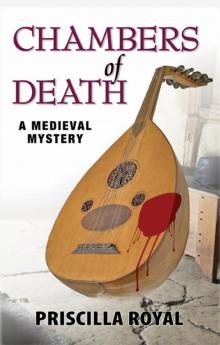 Chambers of Death mm-6
Chambers of Death mm-6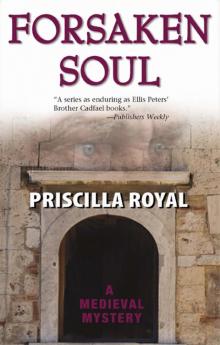 Forsaken Soul
Forsaken Soul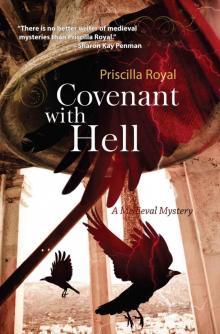 Covenant With Hell (Medieval Mysteries)
Covenant With Hell (Medieval Mysteries)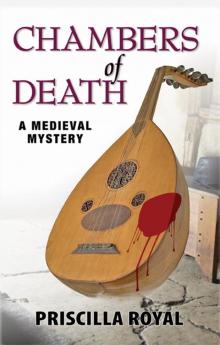 Chambers of Death
Chambers of Death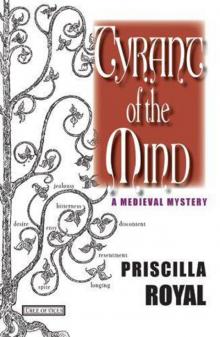 Tyrant of the Mind
Tyrant of the Mind Wild Justice
Wild Justice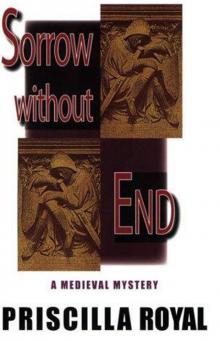 Sorrow Without End
Sorrow Without End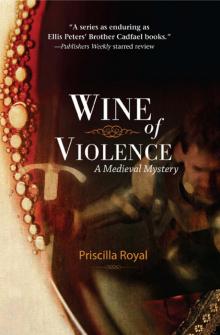 Wine of Violence
Wine of Violence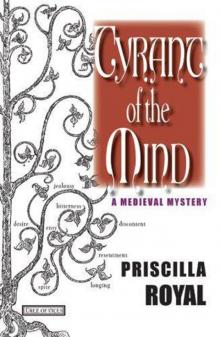 Tyrant of the Mind mm-2
Tyrant of the Mind mm-2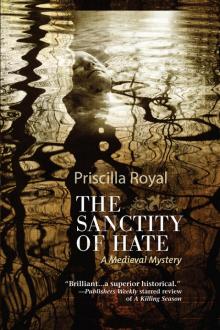 The Sanctity of Hate
The Sanctity of Hate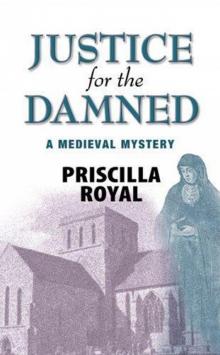 Justice for the Damned
Justice for the Damned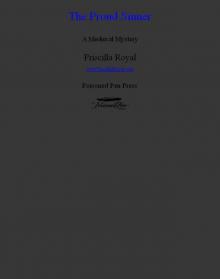 The Proud Sinner
The Proud Sinner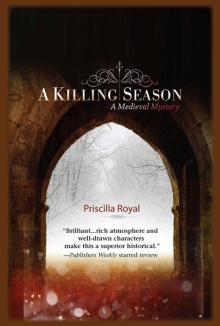 A Killing Season mm-8
A Killing Season mm-8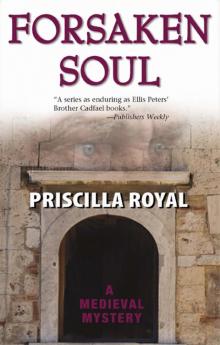 Forsaken Soul mm-5
Forsaken Soul mm-5 Valley of Dry Bones mm-7
Valley of Dry Bones mm-7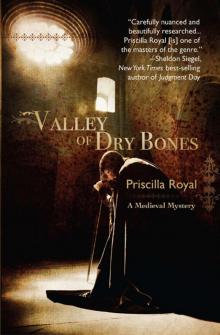 Valley of Dry Bones
Valley of Dry Bones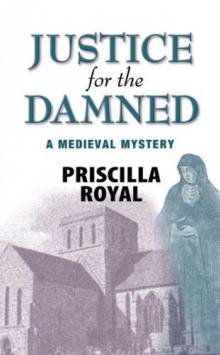 Justice for the Damned mm-4
Justice for the Damned mm-4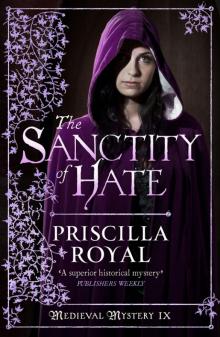 Sanctity of Hate
Sanctity of Hate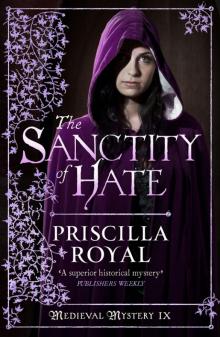 Sanctity of Hate mm-9
Sanctity of Hate mm-9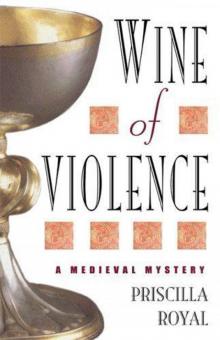 Wine of Violence mm-1
Wine of Violence mm-1